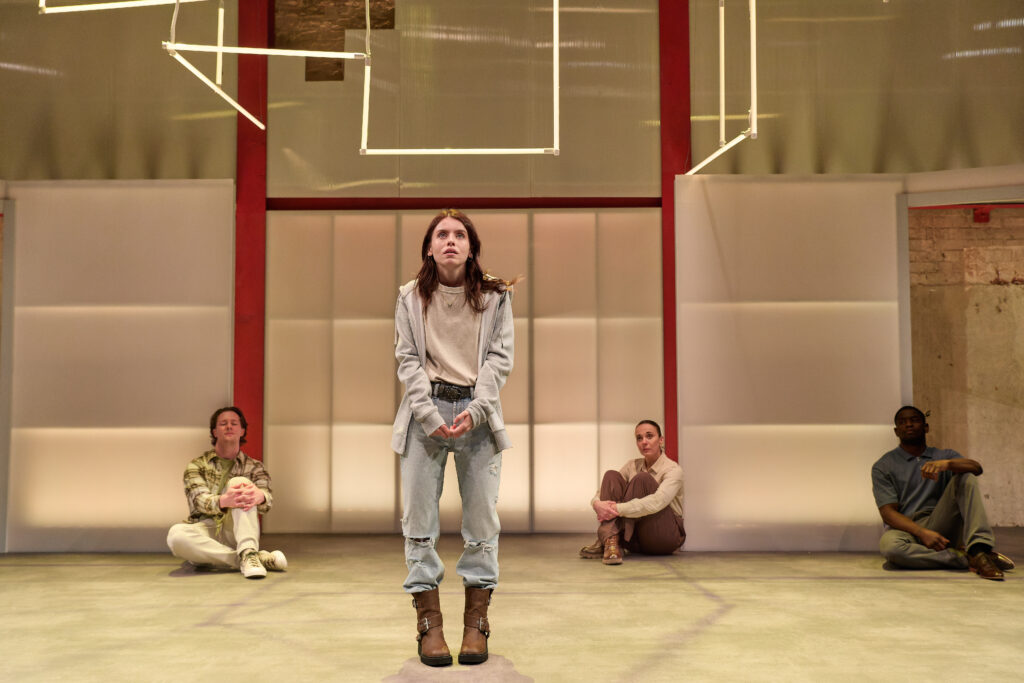When it happens to you is a hard-hitting drama by bestselling American writer Tawni O’Dell, harrowingly based on her own experiences navigating familial trauma. Premiering in Europe from the intimate setting of the Park Theatre, Amanda Abbington plays Tara – the pulsing heartbeat of the 90-minute four-hander who carries the audience through a retrospective journey of pain, regret, love, despair, and hope.
From the very outset, Abbingdon – who portrays a protective, troubled and complicated maternal figure, establishes a frank and trusting rapport with the audience – powerfully utilising eye contact and confiding in us with intention and purpose. Within seconds of the play starting we are confronted with the heinous crime at the epicentre of the narrative, from which shockwaves reverberate outwards. The immediacy of this revelation sets the tone for a nuanced and raw exploration of the lasting effects of sexual violence – a theme present in every scene of this production. Rosie Day plays Tara’s daughter Esme, and delivers a strikingly visceral and powerful performance as someone navigating the throes of trauma and violation with emotional nuance and physical expression. Miles Molan plays Tara’s son and Esme’s brother, and pierces the heavy pressure with lighter moments of levity and laughter, while also packing a punch as he explores and represents the impact of rape on broader family members and the eco-system of the family unit as a whole, as well as an important male perspective on this category of violence. And Tok Stephen does a fantastic job at morphing into supporting characters throughout the play, a constant presence that fluidly and truthfully brings various scenes and pivotal moments to life.

Jez Bond’s direction is seamless – the play has the pace of a slick thriller and leaves no space for restlessness or fatigue. Use of space is also very effective – as characters dart from corner to corner, or circle each other frantically, or sit down and observe their fellow actors, it is difficult to not become entirely consumed in every second of action. While the entire cast are crucial to the story-telling, it’s the two female leads who’s performances should be revered – tackling and embodying such deeply emotional and challenging themes with sensitivity, strength and humanity. When it happens to you is a perfect example of the power and importance of live theater – exploring challenging subject matter through the lens of people breathing and moving in the room, “something alive being passed from the creatives to the audience” (Jez Bond) and the meta nature of O’Dell’s ‘theatrical memoir’ script adds another dimension of impact and poignance.

The play powerfully depicts the lasting nature of sexual trauma – a stand-out line being ‘the crime doesn’t fade, it metastasises!’ and we truly see this played out in narrative form. However, some references to the nature of invisible wounds could have been more powerfully conveyed implicitly, and one could argue that the talent of the cast meant there was scope to let action and expression alone do some of the talking – this felt especially salient during scenes where Tara illustrates her inner dialogue vs what was actually said, an artistic decision that felt a little jarring against the backdrop of such loaded and complex drama.
When it happens to you thoughtfully explores and illustrates the infinite cracks, ripples and hairline fractures that the blunt force of one act of violence can and does provoke, with layers of nuance and depth that unravel as the play unfolds. However, O’Dell also infuses redemption and hope into her writing, revealing a nuanced perspective on life after trauma and the impact on self-worth and identity. To quote the line Esme closes the play with – ‘I read every word’, I heard and absorbed every word of When it happens to you and each one has stayed with me since.
